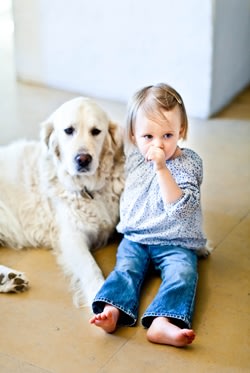
This is an article that appeared on Yahoo Lifestyle on 11th July 2012:
Having a dog at home may help babies to ward off infections, research suggests.
Compared with babies living in a pet-free environment, infants with a dog or who are around dogs in their first year of life, are generally healthier and suffer from fewer ear infections, colds and need fewer antibiotics, according to a study published in the journal Pediatrics.
 Dr Elija Bergroth from Kuopio University Hospital, Finland who led the research suggested that exposure to dogs may help to boost babies' immune systems by bringing in dirt and allergens from outdoors.
Dr Elija Bergroth from Kuopio University Hospital, Finland who led the research suggested that exposure to dogs may help to boost babies' immune systems by bringing in dirt and allergens from outdoors.
For the study, the researchers tracked 397 children in Finland from the age of nine weeks until they were a year old. Any respiratory symptoms, infections and contact with dogs and cats were recorded by the parents in weekly diaries. The parents also filled in a questionnaire at the end of the study.
Overall, infants living with a dog or with frequent exposure to one, had fewer respiratory tract symptoms such as runny or blocked nose, coughs and wheezing and fewer ear infections and tended to be treated less often with antibiotics.
Although cats were also found to have a protective effect, the findings were not significant once other factors were taken into account, including whether the baby was breastfed, a family history of allergies, having a mother who smoked or having older siblings at home.
The protective effect was greatest for children who had dogs that spent less than six hours a day at home, the study found.
Dogs which spend much of their time outdoors might bring more dirt indoors, increasing a baby's exposure to various bacteria and viruses, and boosting the immune system, the researchers said.
This fits in with the so-called hygiene hypothesis, which proposes that we need exposure to germs in early childhood to prime the immune system to work effectively. Some have blamed increasingly germ-free homes for the rising number of people with allergies.
The authors wrote: "These results suggest that dog contacts may have a protective effect on respiratory tract infections during the first year of life.
"Our findings support the theory that during the first year of life, animal contacts are important, possible leading to better resistance to infectious respiratory illnesses during childhood."

